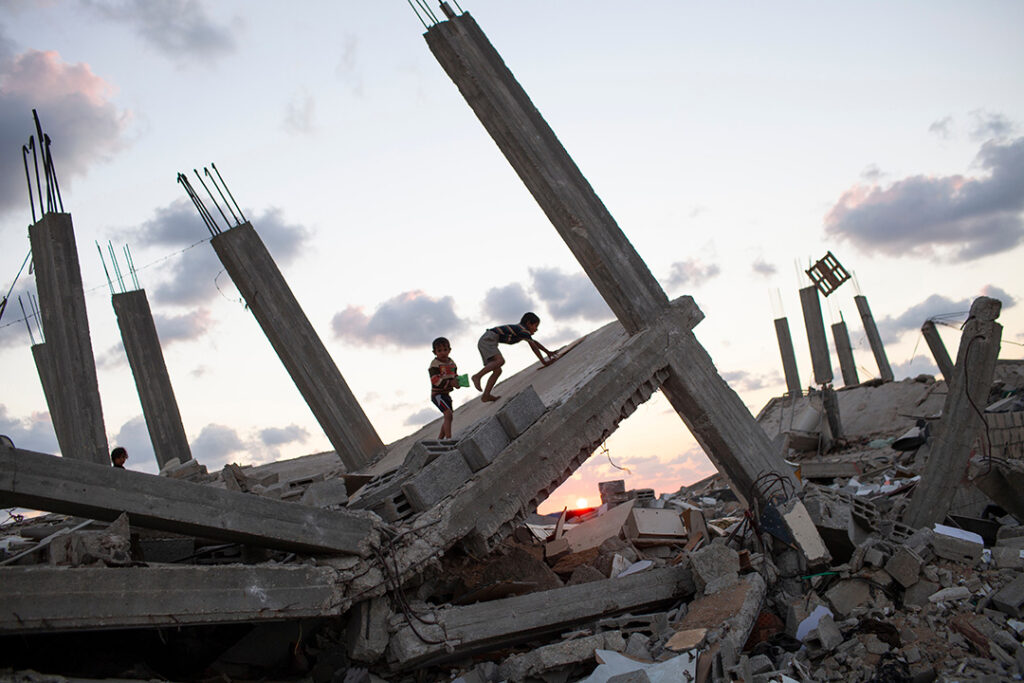Hamas and the religious far-right in Israel: Alternatives to the status quo
Hamas and the religious far-right in Israel: Alternatives to the status quo
As the Israel-Gaza war continues, our analyst Martha Scott-Cracknell looks at how Hamas and the religious far-right in Israel offer an alternative to the status quo.
This weekly comment was written by Martha Scott-Cracknell and reflects her personal analyses and opinions, rather than those of EARS.
On Saturday 7th October 2023, Hamas, an Islamist political and military organisation that currently governs the Gaza Strip in Palestine, launched a sudden and devastating assault on Israel.[1] From Gaza, Hamas militants unleashed a barrage of missiles and conducted violent incursions into southern Israel, resulting in the loss of Israeli lives and the taking of hostages. This attack, described as “the darkest day in Israeli history,” [2] seemingly caught Israel off guard.
In response, Israeli Prime Minister Benjamin Netanyahu declared a state of war with Hamas, vowing that the “enemy will pay an unprecedented price.”[3] As a result, the Israeli military has begun a total destruction of Gaza, displacing an estimated 1 million Gazans in the first week of the war.[4] As of 19th October 2023, a total of 3,478 people in Gaza have been killed while 12,065 others have been wounded. In the occupied West Bank, 69 people have been killed and 1,300 wounded. In Israel, at least 1,400 people have been killed and 3,800 injured.[5]
The ongoing war has raised many questions about both Hamas’ and Israel’s justification for inflicting so much respective suffering. This article aims to evaluate the growth of Hamas’ Islamic fundamentalism and the growth of Israel’s religious far-right in recent years.
Notably, both these ideologies have not surged due to increased religiosity among Israeli and Palestinian citizens. Rather, they offer alternative narratives to the status quo. For many Palestinians, Hamas provides an outlet for frustration over the perceived inaction of Fatah, the primary political party in the West Bank. In Israel, the religious far-right exploits the fear of losing Israel’s Jewish identity. Analysing the development of these two ideologies will also help with understanding why the current war in Israel and Gaza has occurred.
Rise of Hamas in Palestine
Hamas, officially known as the Islamic Resistance Movement, emerged as the political wing of the Muslim Brotherhood in Gaza in 1987, shortly after the outbreak of the First Intifada[6] against Israel. Sheikh Ahmed Yassin, a Palestinian cleric who transitioned from a life of Islamic scholarship to activism, founded Hamas.[7] According to its charter, Hamas’ core theological objective is the establishment of an Islamic state spanning from the Mediterranean to the Jordan River.[8] This concept, pushed by Hamas as part of their rejection of Israel’s right to exist, is widely condemned as antisemitic.[9] Importantly, Hamas’ ideology is reflective of an fundamentalist Islamist view and not representative of other Islamic denominations.
Despite its Islamist inspiration, Hamas primarily functions as a political organisation with democratically elected leaders.[10] When Israel withdrew from Gaza in 2005, Hamas secured a majority of seats in the 2006 election and formed a government. The support for Hamas stemmed not only from the social services it provided but also from a rejection of the incumbent Fatah, perceived as corrupt and ineffective in its negotiations with Israel, leaving many Palestinians disillusioned.[11]
For the past 17 years, Hamas has been the ruling authority in Gaza, having pushed Fatah out when they refused to recognise Hamas’ 2006 electoral victory.[12] However, as several international reports[13] have detailed, Hamas rules over Gaza with an iron fist. The majority of Gazans feel they cannot openly criticise Hamas[14] and face victimisation, assault, or torture if they do so.[15]
Nevertheless, polling conducted by the Palestinian Center for Policy and Survey Research in 2021 found that 53% of Palestinians still believe Hamas is “most deserving of representing and leading the Palestinian people,” while only 14% prefer Fatah.[16] Pollsters have called this a “dramatic” shift but it is a common trend – in times of confrontation, support swings toward Hamas.
The growing support for Hamas, particularly during times of tension, can be attributed to several factors. While Fatah is happier to negotiate with Israel, Hamas prefers armed resistance and does not recognise Israel as a legitimate state.[17] After enduring decades of Israeli occupation, with deteriorating human rights and daily conditions, it is not surprising that Hamas’ more radical approach gains popularity among desperate Palestinians. It is evident that this increased support for Hamas is not primarily rooted in their Islamist fundamentalist ideology. Instead, they are viewed as the sole viable organisation capable of altering the plight of Palestinians.
Rise of the religious far-right in Israel
Israeli politics, historically influenced by Jewish ideology due to its status as a religious state, is witnessing the increasing popularity of a new stance. In the November 2022 elections, a coalition of far-right parties, led by the Religious Zionism party, became the third-largest political force.[18] This alliance is integral to Prime Minister Netanyahu’s right-wing government. Bezalel Smotrich, the leader of the Religious Zionist Party, serves as Minister of Finance and far-right politician Itamar Ben Gvir serves as Minister of National Security.[19]
This Religious Zionist ideology includes plans such as annexation of West Bank settlements, expulsion of asylum-seekers, and political control of the judicial system. It promotes preservation of “family values” which translates as hostility to LGBTQ+ people. Notably, politicians such as Smotrich and Ben Gvir stress the strengthening of Israel’s Jewish identity, mainly by imposing religious law.[20]
However, the growing support for Religious Zionist political parties in Israel does not align with a more religious populace. In fact, a 2021 poll reveals an increasing secular trend among Israeli Jews.[21] Instead, the shift to the far-right in the 2022 election stemmed from concerns about Israel losing its Jewish identity, often intertwined with anti-Arab sentiment for these parties.[22] For example, Ben Gvir has spoken about his plans to deport Arab Israeli politicians whom he calls “terrorists” and deems to be disloyal to the state.[23] He claims that doing so would protect Israeli Jews and strengthen Jewish identity, but to a large extent this can be conceived as “a cover for ensuring the second-class status of Arab citizens.”[24]
What does this teach us about the Israel-Gaza war?
Therefore, the rise of Hamas in Palestine and the religious far-right in Israel does not stem from an increase in religiosity among Palestinians and Israelis. Rather, these ideologies have gained prominence as alternatives to the existing status quo.
In times of enduring hardships faced by Palestinians due to decades of Israeli occupation, many have turned to Hamas as an organisation that takes action, and make the international community wake up to the reality of Palestinian suffering. Meanwhile, in Israel, the religious far-right has tapped into legitimate Israeli security concerns, adopting an uncompromising stance towards Palestinians.
Whilst it is not certain, there are signs that Hamas and the religious far-right in Israel will continue to grow in popularity following the current Israel-Gaza war. What is certain is that the situation in Israel and Gaza is desperate and marks an incredibly dark chapter in the world’s history.
This weekly comment was written by Martha Scott-Cracknell and reflects her personal analyses and opinions, rather than those of EARS.
Interested in similar topics? Go to our Dashboard.
Sources
[1] Death came from sea, air and ground: A timeline of surprise attack by Hamas on Israel – ABC News
[2] First Thing: IDF decries surprise Hamas attack as ‘worst day in Israeli history’ | US news | The Guardian
[3] Death came from sea, air and ground: A timeline of surprise attack by Hamas on Israel – ABC News
[4]Israel-Hamas war updates: Israeli water supply move a ‘distraction’
[5] Israel-Hamas war: List of key events, day 13 | Israel-Palestine conflict News | Al Jazeera
[6] The First Intifada was a sustained series of protests and violent riots carried out by Palestinians in the Israeli-occupied Palestinian territories and Israel between 1987 and 1993. Intifada | History, Meaning, Cause, & Significance | Britannica
[7] What Is Hamas? | Council on Foreign Relations
[8] What role does religion play in Hamas’ political behaviour?
[9] 7 Ways Some Anti-Israel Protests Have Spread Antisemitism | AJC
[10] What role does religion play in Hamas’ political behaviour?
[11] What Is Hamas? | Council on Foreign Relations
[12] Hamas and Fatah: How are the two groups different?
[13] Strangling Necks- Amnesty Report
[14] Why Hamas still relies on violent repression to control Gaza
[15] Why Hamas still relies on violent repression to control Gaza
[16] Poll finds dramatic rise in Palestinian support for Hamas | AP News
[17] Hamas and Fatah: How are the two groups different?
[18] Israel’s Election Empowers a More Muscular Religious Zionism – The New York Times
[19] Israel’s Election Empowers a More Muscular Religious Zionism – The New York Times
[20] What Makes Israel’s Far Right Different – Foreign Policy
[21] Religion has outsized role in Israel, yet most of its Jews aren’t really observant
[22] Far Right’s Rise in Israel Driven by Anxiety and Fear – The New York Times
[23] Extremist lawmaker surges ahead of elections in Israel | AP News
[24] What Makes Israel’s Far Right Different – Foreign Policy






